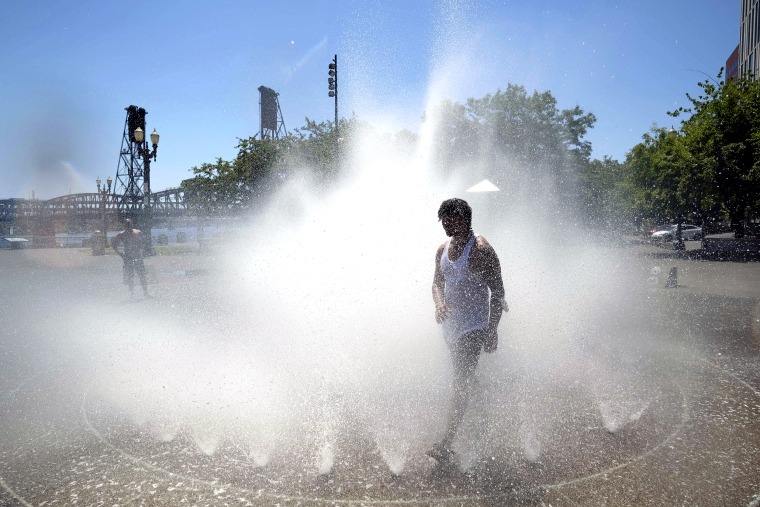Larry O'Neill knew a heat wave was coming, but he still couldn't believe what the climate models were telling him.
The projected temperatures for this week were so unusually high — between 115 and 120 degrees Fahrenheit across parts of the Pacific Northwest — that O'Neill, Oregon's state climatologist, felt something must be off.
"The predictions seemed completely outlandish," said O'Neill, an associate professor at Oregon State University. "They were so crazy insane that professional forecasters and people like myself thought something must be wrong with the models."
As it turned out, the forecasts were right.
With global warming making heat waves and other extreme weather events both more likely and more severe, this week's sizzling temperatures may herald a climate reality that scientists thought was still decades in the future.
"We see evidence of climate change in the data already, but in the Pacific Northwest, we thought maybe by the middle of the century is when we would start to see really substantial and impactful events," O'Neill said. "But we're seeing those now."
Across the western United States, more than 35 cities tied or set temperature records Monday, with several places shattering their all-time highs. Seattle posted a new record of 108 degrees, 5 degrees hotter than the city's previous all-time record, and Portland, Oregon, reached a scorching 116 degrees, surpassing the city's previous milestone by 8 degrees.
The intensity of the heat, particularly in a region of the country known for its mild conditions, has been shocking, said Nicholas Bond, a research scientist at the University of Washington and Washington's state climatologist.
"The magnitude by which records are being broken — not by a degree or so but by 5 degrees and in some cases more — is really stunning," Bond said. "I didn't really expect anything like this until further into the future."

What's driving the oppressive heat is a ridge of high pressure parked over the Pacific Northwest that Bond said was "exquisitely poised to deliver hot temperatures."
These giant domes of heat have been associated with tropical cyclone activity in the western Pacific Ocean, which can alter the circulation of air over the Northern Hemisphere and generate unusual weather patterns.
"The tropical cyclones tend to disrupt the jet stream all across the Pacific Ocean," O'Neill said, adding that they can affect both high- and low-pressure systems. "If we get a tropical cyclone, we're three times more likely to get a high-pressure ridge set up close to where we see this one."
It's not yet clear how climate change is affecting the jet stream and resulting weather systems, but the consequences of these complex atmospheric perturbations taking place against the backdrop of global warming is well understood.
Average temperatures in the Pacific Northwest have warmed by roughly 1.3 degrees since 1895, according to the University of Washington's Climate Impacts Group, and most cities in the region feel more than 2 degrees warmer in the summer than they did in 1970.
"Along with that warming, we've seen an increase in extreme heat events, and these events are becoming more frequent, more intense and longer in duration," said Meade Krosby, a senior scientist with the Climate Impacts Group.
It's a trend that is playing out across the country. A national climate assessment conducted in 2018 found that heat waves in the U.S. occurred an average of six times per year in the 2010s, up from an average of two times a year five decades earlier.
The effects of extreme heat are similarly being felt around the world. Parts of eastern Europe and Russia are currently baking under record highs, with some Bulgarian cities predicted to reach 104 degrees and temperatures in Siberia soaring to nearly 90 degrees.
Though attributing any specific event to climate change is tricky, scientists say the overall effect of global warming is undeniable, creating conditions that are ripe for heat waves and other extreme weather events.
"The question is no longer if climate change caused a specific heat event, but by how much," Krosby said.
Temperatures in parts of Oregon and Washington have likely peaked, but hotter-than-usual conditions are expected to linger through the weekend.
Experts said it's disconcerting to see such a crippling heat wave this early in the summer, adding that the implications could be dire for this year's wildfire season.
For O'Neill, he hopes the recent events act as a wake-up call about the immediate impacts of global warming.
"All of this adds to the danger and risk that we face," he said. "Climate change absolutely loads the dice towards more extreme events."
